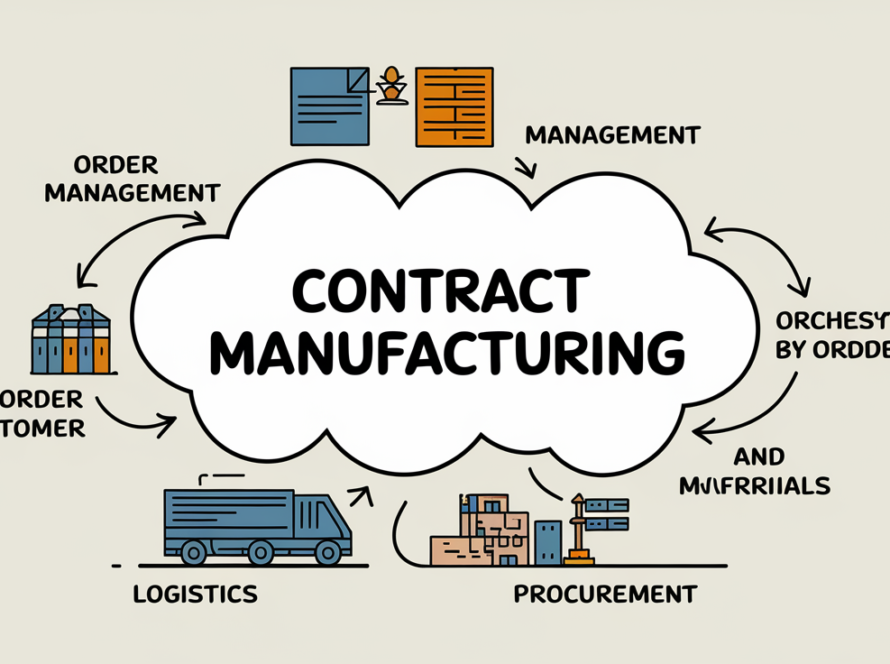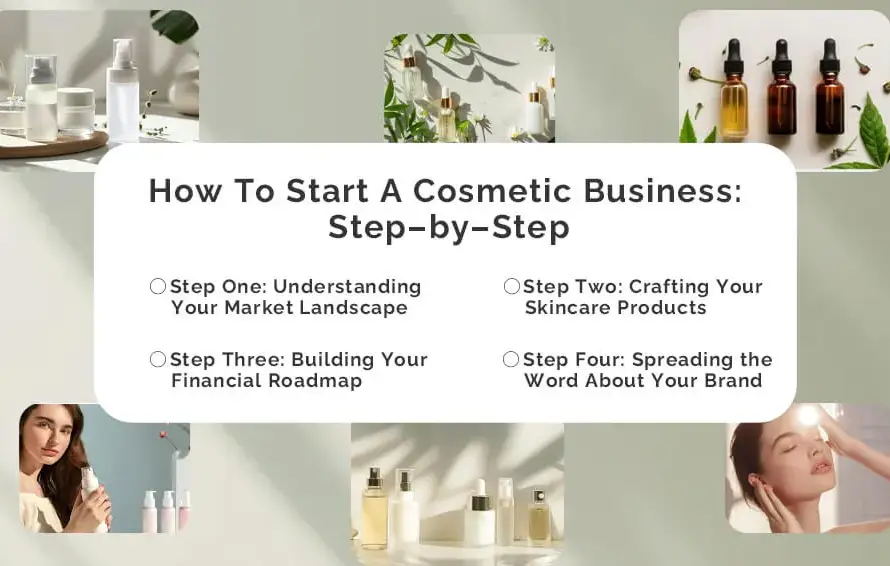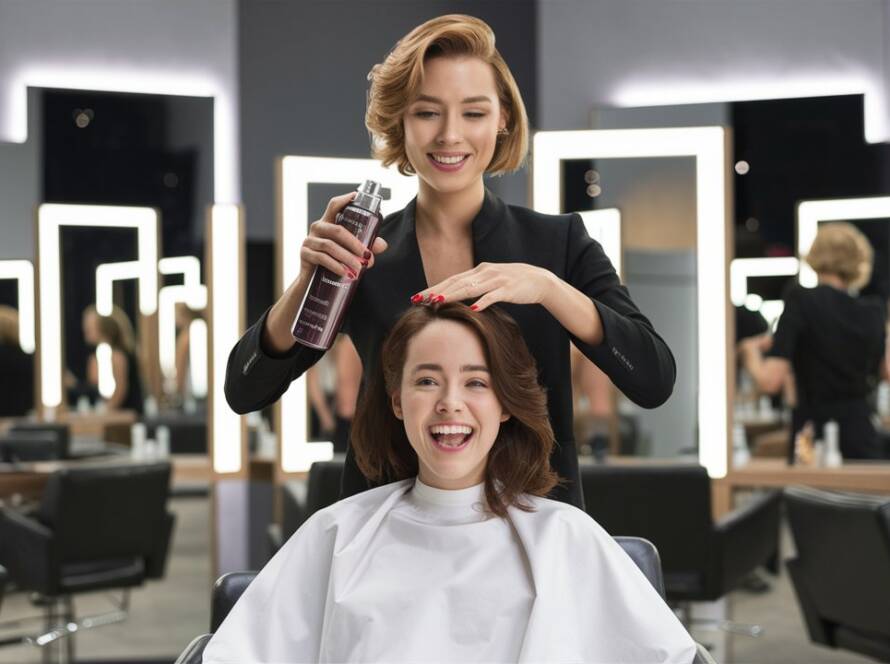Embarking on the journey of starting a hair conditioner business can be both thrilling and rewarding. The hair care industry is booming, and conditioners are a staple in every beauty regimen. But to truly succeed in this competitive market, you need a clear roadmap. This comprehensive guide walks you through the 7 Essential Steps for Starting Your Hair Conditioner Business, from understanding market demand to scaling your operations. By the end, you’ll know exactly how to create a product that stands out and resonates with your target audience. Plus, you’ll discover how Royal Industries can support your venture every step of the way.
Table of Contents
- Step 1: Understanding the Market Demand for Hair Conditioners
- Identifying Your Target Audience When Starting Your Hair Conditioner Business
- Why Knowing Your Customer is Crucial for Success
- Analyzing Current Trends in the Hair Care Industry
- Top Trends Shaping the Hair Conditioner Market
- Step 2: Crafting a Unique Selling Proposition (USP) for Your Conditioner
- What Makes Your Conditioner Stand Out?
- Creating a Formula That Addresses Specific Hair Concerns
- Branding Your Hair Conditioner
- Building a Brand That Resonates with Your Target Audience When Starting Your Hair Conditioner Business
- Step 3: Sourcing High-Quality Ingredients for Starting Your Hair Conditioner Business
- Why Ingredient Quality Matters
- Choosing Ingredients that Align with Your Brand Values
- Sustainable and Ethical Sourcing Options
- How Sustainability Can Elevate Your Brand
- Step 4: Setting Up Production for Your Hair Conditioner
- Small-Scale vs. Large-Scale Manufacturing
- Deciding the Right Production Scale for Your Business
- Ensuring Compliance with Industry Standards
- Navigating Regulatory Requirements for Starting Your Hair Conditioner Business
- Step 5: Packaging and Branding Your Hair Conditioner
- Creating Eye-Catching Packaging
- Designing Packaging That Reflects Your Brand Identity
- Labeling Requirements and Best Practices
- What to Include on Your Hair Conditioner Labels
- Step 6: Developing a Go-To-Market Strategy for Starting Your Hair Conditioner Business
- Choosing the Right Sales Channels
- Online vs. Offline Sales: What Works Best?
- Marketing Tactics for Hair Conditioner Businesses
- Leveraging Social Media and Influencer Marketing
- Step 7: Scaling Your Hair Conditioner Business for Growth
- Expanding Your Product Line
- Introducing New Variants and Sizes
- Exploring New Markets
- Going Global with Your Hair Conditioner Brand
- How Royal Industries Can Help You When Starting Your Hair Conditioner Business
- Expert Manufacturing and Private Labeling Services
- Why Partnering with Royal Industries Ensures Success
- Comprehensive Support from Concept to Launch
- Key Takeaways
- FAQs
Step 1: Understanding the Market Demand for Hair Conditioners
Before you dive headfirst into starting a hair conditioner business, Market demand must be understood. The hair care sector, which is increasing quickly as customers care more about their hair, relies on hair conditioners. You must go beyond the basics to create an effect. This includes knowing your customers, what they want, and the newest trends that may affect their purchases.
Identifying Your Target Audience When Starting Your Hair Conditioner Business
One of the first things to do when starting a hair conditioner business is to clearly define your target audience. Understanding who your ideal customer is will shape every decision you make, from product formulation to marketing strategies. Are you catering to eco-conscious millennials looking for organic hair conditioners? Maybe you’re targeting busy professionals that require rapid, effective solutions? More specificity helps you personalize your product to their demands.
Conduct rigorous market research to discover your target audience. To determine who will buy your items, analyze demographic data like age, gender, income, and geography. Explore psychographics—what drives your prospects? What are their hair care issues? If your target market has sensitive scalps, your product may need to be chemical-free., making it appealing to those searching for hair conditioner manufacturers near me who specialize in gentle formulations.
Why Knowing Your Customer is Crucial for Success
Knowing your customer goes beyond demographics to understanding their requirements and wants. Knowing your customers well lets you create items that exceed their expectations. This deep awareness turns casual shoppers become brand supporters.
If your audience values sustainability, eco-friendly packaging and materials can set your product apart. Highlighting these aspects in your branding efforts can make your hair conditioner business a go-to choice for those who prioritize green beauty. In this way, your brand becomes more than just a product—it becomes a reflection of your customers’ values and lifestyle choices.
Analyzing Current Trends in the Hair Care Industry
The hair care industry is constantly evolving, with new trends emerging all the time. Staying ahead of these trends is crucial for any hair conditioner business looking to stay competitive. Whether it’s the shift towards organic hair conditioners or the growing demand for Ayurvedic hair conditioners, Understanding these trends lets you predict consumer wants and position your offering.
Demand for natural and organic products is a major trend. Consumers are more aware than ever and want effective, hair- and environment-friendly products. This is why many hair conditioner manufacturing companies are focusing on clean formulations free from harmful chemicals. Another trend is personalization; customers are looking for products tailored to their specific hair type and concerns, from curly hair to color-treated hair.
Top Trends Shaping the Hair Conditioner Market
The hair conditioner market is shaped by several key trends that savvy entrepreneurs should keep in mind. First, there’s a rising interest in Ayurvedic hair conditioners,which offer natural, holistic hair care using ancient Indian remedies. For their nourishing characteristics, amla, bhringraj, and neem are popular in wellness-focused cosmetic products.
Sustainability is another major theme. From eco-friendly packaging to ethically sourced materials, customers are choosing businesses that reflect their values. This trend extends to private label hair conditioners, where businesses offer customized products that cater to specific consumer needs, such as vegan or cruelty-free options. By tapping into these trends, your hair conditioner business can stand out in a crowded marketplace.
Step 2: Crafting a Unique Selling Proposition (USP) for Your Conditioner
In a market brimming with choices, crafting a Unique Selling Proposition (USP) is essential. Your USP is what sets your hair conditioner business apart from the competition. Unique features or benefits make people choose your product over others. Your marketing plan should revolve around your USP, whether it’s a unique ingredient, formulation, or brand story.
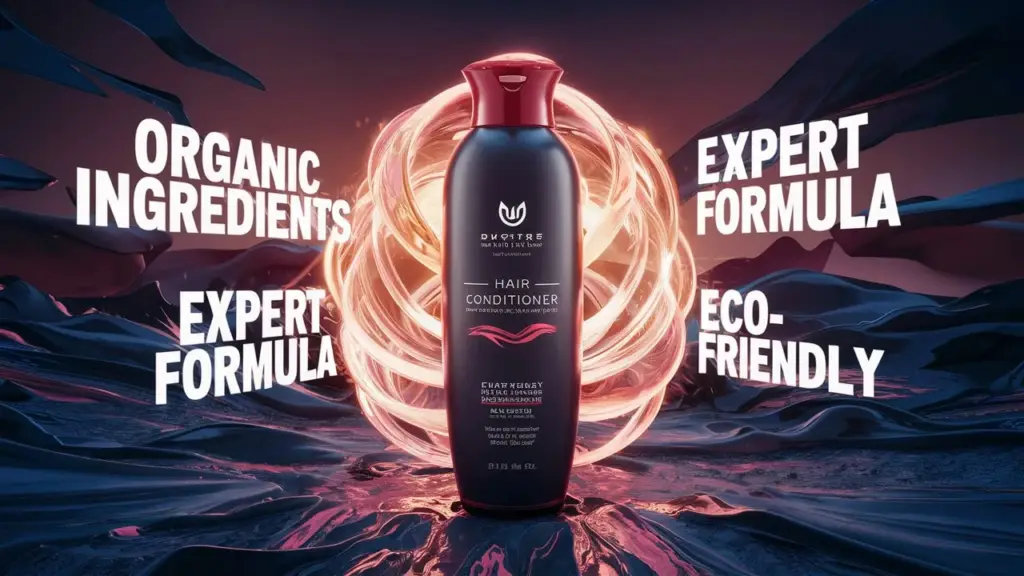
What Makes Your Conditioner Stand Out?
To develop a compelling USP, you need to identify what makes your conditioner unique in the hair conditioner market.Does it use exotic botanicals not found in other products? Could there be a formulation that solves a hair problem better than anything else? Whatever it is, branding and marketing should center on it.
For instance, if your conditioner is made with rare botanical extracts or Ayurvedic ingredients, this can be a major selling point. Such products appeal to consumers looking for natural and effective solutions, setting your brand apart in the hair care product niche. Highlighting these unique aspects in your marketing materials will help you attract a dedicated customer base that values what your brand has to offer.
Creating a Formula That Addresses Specific Hair Concerns
One of the best ways to carve out a niche for your hair conditioner business is to develop a product that addresses specific hair concerns. Targeted remedies for frizz, color, and dry scalps are becoming more popular. By selling a conditioner that tackles these difficulties, you might attract customers looking for effective, specialized solutions.
If you target color-treated hair, you may create a conditioner that prevents fading and boosts color vitality. UV filters, antioxidants, and other protective substances may be used. Partnering with hair conditioner cosmetic manufacturers who have experience in developing such targeted products can be invaluable in bringing your vision to life.
Branding Your Hair Conditioner
Branding is a critical aspect of any successful hair conditioner business. It’s your customers’ complete product experience, not simply a logo or phrase. Your brand should reflect your company’s values—luxury, sustainability, or innovation.
Establish your brand’s mission and principles. What should your brand represent? For example, if you’re focusing on organic hair conditioners, your brand might emphasize purity, natural beauty, and environmental responsibility. Your packaging, marketing materials, and tone of voice should reflect these ideals.
Being consistent is crucial in branding. Brand messaging should be consistent across your website, social media, and product packaging. This increases customer trust and brand recognition. Working with top cosmetic manufacturers in india who understand the importance of branding can help you create a cohesive and impactful brand identity.
Building a Brand That Resonates with Your Target Audience When Starting Your Hair Conditioner Business
You must know what your audience values to create a brand that connects. Your brand should resonate with their dreams and desires, going beyond product functionality. This link converts first-time buyers into brand advocates.
Consider using storytelling as a tool to connect with your audience. Share your brand’s journey—why you started your hair conditioner business, the challenges you faced, and how your products make a difference. Your marketing, social media, and packaging can include this narrative to give consumers a sense of authenticity.
In addition to storytelling, consider brand visuals. Your colors, typefaces, and artwork should match your brand and appeal to your audience. If you want to attract younger, eco-conscious customers, employ earthy colors, minimalist designs, and eco-friendly packaging. Collaborating with cosmetic manufacturers in delhi ncr who understand the local market can also help you fine-tune your branding strategy to better resonate with your audience.
Step 3: Sourcing High-Quality Ingredients for Starting Your Hair Conditioner Business
Sourcing high-quality ingredients is one of the most important steps in starting a hair conditioner business. Ingredients affect product efficacy and consumer attractiveness. When people are more cognizant of what they put on their bodies, high-quality, ethically sourced products may set your business apart.

Why Ingredient Quality Matters
Conditioner success depends on ingredient quality. High-quality ingredients improve product performance and safety. Customers are more likely to return if your conditioner improves hair shine, frizz, or manageability.
Use of high-quality ingredients also meets the beauty industry’s growing transparency need. Consumers increasingly want brands to disclose their ingredient and sourcing policies. By prioritizing ingredient quality, you can build trust with your customers and position your brand as a leader in the hair care product niche.
Choosing Ingredients that Align with Your Brand Values
Choose conditioner ingredients that match your brand values. If your brand prioritizes sustainability, choose ethically sourced, biodegradable, and environmentally friendly ingredients. This could mean utilizing pesticide-free plant-based foods or fair trade ingredients that assist local communities.
If your brand emphasises natural and holistic beauty, consider incorporating Ayurvedic ingredients like amla, bhringraj, and neem. These ingredients not only align with the values of health-conscious consumers but also add a unique selling point to your product. Partnering with reputable hair conditioner manufacturers in India can help ensure that your ingredients meet the highest standards of quality and sustainability.
Sustainable and Ethical Sourcing Options
Responsible sourcing and sustainability are now important to any successful cosmetic firm. Sustainability-focused brands are becoming more popular as consumers become more aware of their purchases’ environmental and social impacts.
When sourcing ingredients for your hair conditioner business, choose vendors who support fair trade, local communities, and the environment. This could mean employing organic foods, renewable resources, or Rainforest Alliance or Fair Trade USA-certified ingredients.
Sustainable procurement ensures a consistent supply of high-quality ingredients, which boosts your brand’s reputation and business longevity. It also lets you tap into the rising market of environmentally concerned consumers eager to pay more for products that match their ideals.
How Sustainability Can Elevate Your Brand
Adding sustainability to your business approach might boost brand perception. Environmentally conscious brands are trusted, responsible, and forward-thinking. Positive perceptions boost customer loyalty and brand advocacy.
Sustainability can also boost marketing. By displaying your commitment to sustainable practises like recyclable packaging, reforestation, and carbon reduction, you can attract environmentally concerned consumers eager to spend more for products that match their ideals.
Sustainability can also strengthen consumer relationships. Consumers today want to feel good about their purchases and believe they’re helping the planet. As a sustainability leader, your business may generate a feeling of purpose and community around your products, strengthening consumer relationships.
Step 4: Setting Up Production for Your Hair Conditioner
Setting up production is a critical step in starting a hair conditioner business. Whether you manufacture in-house or outsource, you need a production procedure that ensures product quality and safety. The decisions you make during this phase will affect your business’s efficiency, cost structure, and scalability.
Small-Scale vs. Large-Scale Manufacturing
When starting production, you must decide whether to use small or large-scale manufacturing. Both methods have pros and cons, and your business’s choice depends on its goals, resources, and market strategy.
Small-Scale Manufacturing: If you’re testing a new brand or product, small-scale manufacturing may be best. This method lets you test the market and get customer input by producing small amounts of your goods. Small-scale manufacturing allows for more customisation and quality control because you can monitor each batch and make modifications.
Small-scale manufacturing lacks economies of scale, hence per-unit costs are greater. If your product takes off and demand rises quickly, you may struggle to stay up with manufacturing, resulting in stockouts and lost revenue.
Large-Scale Manufacturing:If you have a clear product and a good go-to-market strategy, large-scale manufacturing may be best. This method lets you create more product, lowering per-unit expenses and increasing profit margins. Large-scale production lets you fulfill larger demand and swiftly scale your firm, making it more efficient.
However, large-scale manufacturing needs significant upfront equipment, facility, and raw material investments. It also takes more cooperation and control to maintain quality standards. If you’re considering large-scale manufacturing, it’s important to work with experienced hair conditioner manufacturing companies that have the capacity and expertise to handle your production needs.
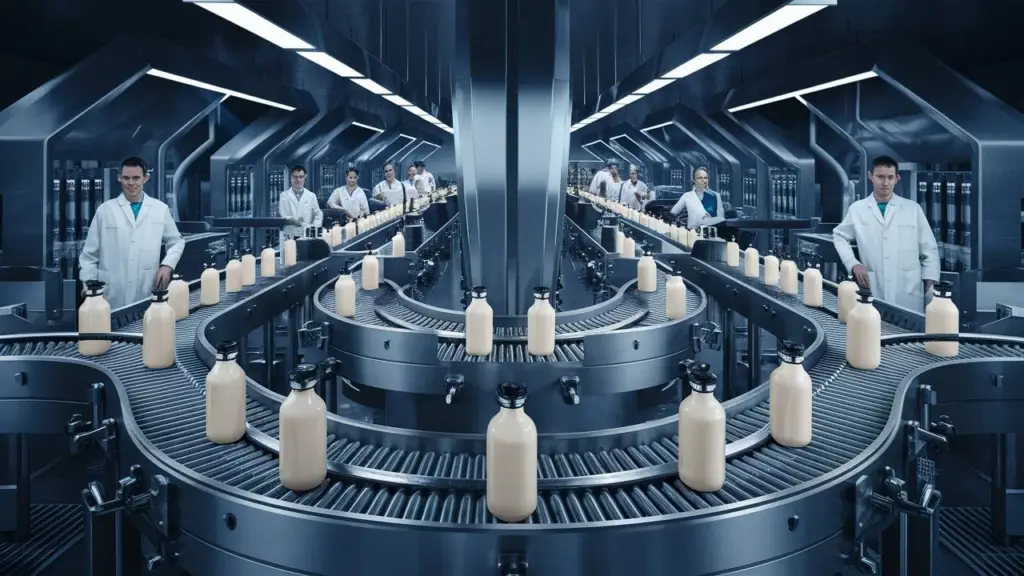
Deciding the Right Production Scale for Your Business
Your business’s production scale depends on its budget, target market, and growth ambitions. You should examine both the short-term and long-term effects of your production size selection, as it will affect your cost structure, pricing strategy, and market response.
In a niche market with a unique product, starting small may be preferable. This lets you perfect your product and marketing before mass manufacturing. Small-scale production lets you test new formulations, packaging, and branding to see what your target audience likes.
However, starting with a greater production scale may provide you an edge in a competitive market with a well-defined product. This method lets you satisfy a wider audience and build your brand quickly. To get your items to consumers, you need a good distribution and marketing plan.
Working with a private label Hair Conditioner manufacturer can help you determine the best production scale for your business. Start small and scale as your business grows with these manufacturers’ flexible manufacturing options. They also help with cost, quality, and supply chain optimization.
Ensuring Compliance with Industry Standards
Compliance with industry standards is crucial when starting a hair conditioner business. These standards ensure your products are safe, effective, and meet market regulations. Financial penalties, product recalls, and brand damage can come from noncompliance.
To ensure compliance, it’s important to work with cosmetic contract manufacturers who are familiar with the regulations in your target markets. These manufacturers can guide you through industry regulations including ingredient limitations, labeling, and safety testing.
Under the Federal Food, Drug, and Cosmetic Act, the FDA oversees cosmetics in the US. This involves labelling, removing hazardous ingredients, and making your items safe. Cosmetics in the EU are controlled by the Cosmetic Products Regulation (EC) No 1223/2009, which requires strict labelling, packaging, and safety.
Also comply with production processes. GMP standards ensure that items are regularly manufactured and controlled to quality standards, thus your production facilities must meet them. GMP includes all elements of production, from raw material sourcing to staff training, equipment maintenance, and product inspection.
Navigating Regulatory Requirements for Starting Your Hair Conditioner Business
If you’re new to beauty, navigating regulations might be difficult. Compliance is vital for corporate success and non-negotiable. Understand the regulations for each market you wish to join because they differ by country and region.
To manufacture and market your items, you may need permissions and certifications in addition to safety and labeling. Cosmetics in India must be registered with the CDSCO before being sold. Tamper-evident seals and warning words may also be required for packing and labeling.
Working with experienced cosmetic manufacturers in delhi and other regions can help ensure that your products meet all necessary regulatory standards.These manufacturers understand cosmetics rules and can help with compliance. They may assist you develop paperwork, test, and qualify your items for market.
Step 5: Packaging and Branding Your Hair Conditioner
Packaging and branding are critical components of your hair conditioner business. The correct packaging protects your product and conveys your brand’s values. However, good branding builds client loyalty and differentiates products in a congested market.
Creating Eye-Catching Packaging
Packaging must be appealing to attract customers and stand out on store shelves. Your package should be attractive, useful, and brand-appropriate. Use eco-friendly materials if your brand promotes sustainability, or luxury packaging if you’re targeting premium clientele.
Product benefits and features should be reflected in packaging design. For example, if you’re offering a conditioner with organic ingredients, your packaging might feature natural colors, earthy textures, and minimalist design elements that convey purity and simplicity.
Packaging helps tell your brand’s story. Color, font, and artwork should be carefully picked to reflect your brand’s personality and beliefs. If your business promotes modern, minimalist beauty, your packaging should have clean lines, simple typography, and neutral colors.
In addition to looks, usefulness matters. Design packaging with user-friendly dispensers, travel-friendly sizes, and recyclable materials to boost customer satisfaction and brand loyalty. Collaborating with cosmetic manufacturers in delhi who specialize in packaging design can help you create packaging that not only looks great but also performs well in the marketplace.
Designing Packaging That Reflects Your Brand Identity
It’s crucial to make a good first impression with your packaging. Your design should convey your brand’s beliefs, stories, and personality while looking good. Consider employing recyclable materials, eco-friendly inks, and designs that show your environmental commitment if your business is sustainable.
Packaging can also highlight product benefits. Highlighting “sulfate-free,” “color-safe,” or “made with organic ingredients” on your package can attract hair conditioner buyers looking for certain traits. Include usage instructions, suggestions, or QR codes that connect to tutorials or product information to improve client experience and boost your hair care brand’s authority.
To ensure that your packaging reflects your brand identity, consider working with a professional designer or a white label cosmetics manufacturer who can help bring your vision to life. These experts can guide you through the process of selecting materials, creating a cohesive design, and ensuring that your packaging aligns with your overall branding strategy.
Labeling Requirements and Best Practices
Labeling gives consumers valuable product information and is essential to packing. This contains ingredients, usage instructions, and product benefits claims. Labeling regulations must be followed to avoid legal complications and sell your product in target areas.
Labeling should use plain language, highlight major benefits, and verify all claims. For example, if you’re marketing your conditioner as an Ayurvedic hair conditioner, you should clearly list the Ayurvedic ingredients and their benefits on the label. Working with experienced cosmetic manufacturers in uttar pradesh can help you navigate the complexities of labeling and ensure that your products meet all regulatory requirements.
Labels should improve consumer experience and meet legal obligations. This may include utilizing clear fonts, directions for use, and relevant certifications or endorsements like “cruelty-free” or “vegan.” A QR code that links to your website or social media can also engage customers and provide further brand and product information.
What to Include on Your Hair Conditioner Labels
Hair conditioner labels should incorporate legal information and appealing elements. The product name, net weight, ingredient list, usage directions, and certifications (organic, cruelty-free) are included. For brand recognition, incorporate your logo, tagline, and contact information.
If your product is for a certain hair type or issue, state so on the label. Make sure your curly hair conditioner is prominently displayed. A QR code that links to your website or social media can also engage customers and provide further brand and product information.
Label layout and style are equally crucial. Key information like the product name and features should be prominently displayed and easy to read. Labels with contrasting colors, bold fonts, and clear iconography are more appealing and instructive.
Finally, ensure your labels meet target market regulations. This may contain precise phrasing, warnings, or size and placement constraints. Working with a third-party manufacturing cosmetics partner who is experienced in regulatory compliance can help ensure that your labels meet all necessary standards.
Step 6: Developing a Go-To-Market Strategy for Starting Your Hair Conditioner Business
Developing a go-to-market strategy is crucial when starting a hair conditioner business. This plan describes how you will market and sell your items to reach your target audience and meet your business goals. A good go-to-market plan can make or break a product launch.
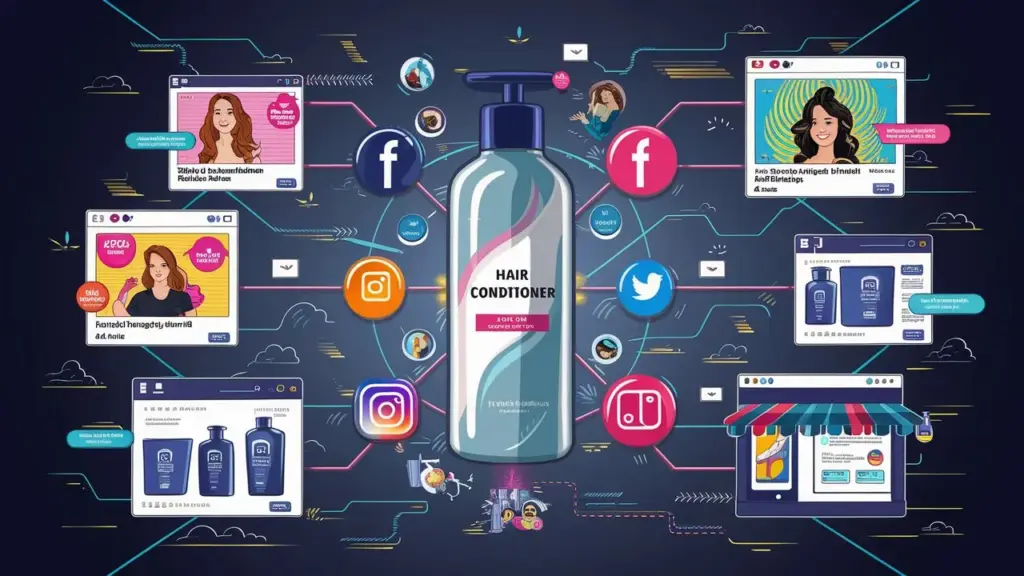
Choosing the Right Sales Channels
You must choose the correct sales channels for your go-to-market plan. You must select whether to sell online, in stores, or both. Each channel has pros and cons, so choose ones that fit your business goals and audience.
E-commerce websites, social media platforms, and online marketplaces are cost-effective ways for new firms to reach a large audience. These channels let you interact with customers, create connections, and get feedback. Online sales also allow you to test new marketing techniques and promotions using real-time data.
If you’re targeting conventional customers, brick-and-mortar establishments may work better. Customers can view, touch, and experience your products in-person at physical retail outlets. This is especially useful for luxury goods, where the in-store experience is vital to the purchase decision.
Consider your target audience’s demands and preferences when choosing sales channels. If your clients are tech-savvy millennials, web and social media may be best. If you’re targeting an older demographic, you may need to use traditional retail channels or direct sales through salons and spas.
Online vs. Offline Sales: What Works Best?
The decision between online and offline sales depends on your target market, product offering, and business goals. Both channels have their advantages, and the best approach for your hair conditioner business may involve a combination of both.
Online Sales: Online sales channels are good for new enterprises due to their convenience, reach, and cheaper overhead. You may reach customers worldwide, operate 24/7, and collect vital customer behavior data with online sales. Online platforms allow for pricing, promotion, and product testing.
However, online sales have their challenges. It can be hard to stand out in the internet marketplace with so many brands competing for attention. Customers may also be wary about buying cosmetic goods online without trying them. Free samples, money-back guarantees, and virtual consultations can help create client trust and overcome these hurdles.
Offline Sales: Offline sales channels including retail stores, hairdressers, and spas offer in-person interactions. Luxury products benefit from customers seeing, touching, and trying them. Offline sales allow you to create relationships with retailers and other business partners, increasing brand visibility and credibility.
Offline sales have greater rent, utilities, and staffing costs. To keep your products available when customers want them, you must manage inventory and distribution operations. Partnering with established retailers or distributors might help you reach your target demographic and manage physical retail to maximize offline sales.
Marketing Tactics for Hair Conditioner Businesses
Effective marketing is essential for the success of your hair conditioner business. Your marketing strategy should combine traditional and digital methods to reach your target demographic and boost sales. Marketing may include social media, influencer collaborations, email, and paid advertising.
Social Media Marketing: Instagram, TikTok, and Pinterest are great for beauty firms since they let you present your items visually. Share product tutorials, customer reviews, behind-the-scenes content, and promotions on various channels. Grow your brand community by responding to comments, surveys, and direct messaging.
Influencer Marketing: Working with brand-aligned influencers may expand your audience and develop customer trust. Find beauty or wellness influencers who love your product and have a large following. Offer free products or collaborate on sponsored posts, giveaways, or reviews to build brand visibility.
Email Marketing: Email marketing builds consumer relationships and encourages repeat purchases. Email marketing can notify customers about new items, promotions, and brand changes. To engage your audience, personalize emails with targeted offers based on consumer behavior and preferences and include advice, lessons, and success stories.
Google Ads, Facebook Ads, and Instagram Ads can help you reach more people and drive targeted traffic to your website or online store. Promote products, perks, and special deals with paid ads. To find out what your audience likes, use video, carousel, and retargeting advertisements.
Leveraging Social Media and Influencer Marketing
Social media and influencer marketing are two of the most effective tools for promoting your hair conditioner business. These platforms allow you to reach a large audience quickly and cost-effectively, making them ideal for new businesses with limited marketing budgets.
Social Media Marketing: Instagram, TikTok, and Pinterest are great for beauty firms since they let you present your items visually. Share product tutorials, customer reviews, behind-the-scenes content, and promotions on various channels. Grow your brand community by responding to comments, surveys, and direct messaging.
Social media material should appeal to your target audience and reflect your brand. Product lessons, customer testimonials, behind-the-scenes information, and promotions are examples. Influencers who share your brand values might help you reach more customers and develop trust.
Influencer Marketing: Working with brand-aligned influencers may expand your audience and develop customer trust. Find beauty or wellness influencers who love your product and have a large following. Offer free products or collaborate on sponsored posts, giveaways, or reviews to build brand visibility.
Consider audience demographics, engagement rates, and brand values when choosing influencers. Create buzz and credibility with influencer product reviews, tutorials, and freebies. Track your influencer marketing to evaluate their impact and improve your strategy.
Step 7: Scaling Your Hair Conditioner Business for Growth
Scaling your hair conditioner business is an exciting yet challenging phase. As your business grows, you’ll need to expand your product line, explore new markets, and increase your production capacity. By taking a strategic approach to scaling, you can maximize your growth potential and ensure long-term success.

Expanding Your Product Line
One of the most effective ways to scale your hair conditioner business is by expanding your product line. Consider adding a leave-in conditioner or deep conditioning treatment to your conditioner. Launch supplementary shampoos, hair masks, or styling products.
You may grow sales, attract new customers, and strengthen your brand by expanding your product portfolio. However, new items must align with your brand values and suit your target audience’s needs. Market research can reveal gaps and opportunities for your brand.
When expanding your product line, consider the following strategies:
- Product Extensions: Introduce new versions of your existing products, such as different scents, formulations, or sizes. For example, if you currently offer a standard conditioner, consider launching a leave-in conditioner or a deep conditioning mask.
- Complementary Products: Expand your product range by offering complementary products that enhance the customer experience. For example, if you offer a conditioner, consider adding a matching shampoo, hair oil, or styling cream.
- Targeted Products: Develop products that cater to specific hair types or concerns, such as products for curly hair, color-treated hair, or sensitive scalps. This allows you to attract a wider audience and address the diverse needs of your customers.
Working with a third-party cosmetic manufacturer can help you develop and produce new products that are consistent with your brand’s quality standards. These manufacturers have the expertise and resources to bring your ideas to life, ensuring that your new products meet the same high standards as your existing ones.
Introducing New Variants and Sizes
New conditioner variations and sizes can help you reach more clients and suit their various needs. For instance, giving travel-sized conditioners to frequent travelers and family-sized ones to cost-conscious customers.
Along with size variations, you can introduce new formulations for specific hair issues, such as a volumizing conditioner for fine hair or a moisturizing conditioner for curly hair. Offering multiple options boosts product attractiveness and repeat sales.
Consider the following when adding sizes and variants:
- Market Research: Conduct market research to understand the preferences and needs of your target audience. Identify gaps in the market where your brand can offer something unique and valuable.
- Customer Feedback: Listen to your customers and use their feedback to guide your product development process. Pay attention to customer reviews, surveys, and social media interactions to identify areas where your products can be improved or expanded.
- Testing: Before launching new products, conduct testing to ensure that they meet your brand’s quality standards and resonate with your target audience. This might include focus groups, beta testing, or limited product launches.
By offering a variety of product options, you can attract a wider audience, increase customer satisfaction, and boost sales. However, it’s important to ensure that your new products align with your brand values and maintain the same level of quality as your existing products.
Exploring New Markets
Expanding into new markets is another key strategy for scaling your hair conditioner business. This could mean exploring international markets or targeting new client groups like men’s or children’s hair care.
Research local rules, consumer preferences, and competition before entering a new market. A customized marketing and distribution strategy will increase your chances of success. Collaborating with cosmetic manufacturers in mumbai who have experience in your target markets can provide valuable insights and support.
When exploring new markets, consider the following:
- Regulatory Compliance: Ensure that your products meet the regulatory requirements of the new market, including labeling, safety, and ingredient regulations. Work with experienced partners who can guide you through the compliance process.
- Localization: Adapt your marketing and product offerings to meet the preferences and needs of the local market. This might include modifying your packaging, branding, or product formulations to better align with local tastes and cultural norms.
- Distribution: Develop a distribution strategy that ensures your products are available where and when customers want them. This might involve partnering with local retailers, distributors, or e-commerce platforms.
Expanding into new markets can be a powerful way to increase your brand’s reach and drive growth. However, it’s important to approach each new market with careful planning and a deep understanding of the local landscape.
Going Global with Your Hair Conditioner Brand
Taking your hair conditioner brand global is a significant milestone that can open up new growth opportunities. However, it also comes with its own set of challenges, including navigating different regulatory environments, adapting your marketing strategy to local cultures, and managing international logistics.
To successfully go global, it’s important to have a strong supply chain and reliable manufacturing partners. Hair conditioner manufacturers near me and other regions can help ensure that your products meet the standards of international markets and are delivered on time. Additionally, you’ll need to invest in localized marketing efforts to build brand awareness and connect with consumers in each market.
When going global, consider the following strategies:
- Market Research: Conduct thorough market research to identify the most promising international markets for your brand. Consider factors such as market size, growth potential, consumer preferences, and competitive landscape.
- Regulatory Compliance: Ensure that your products meet the regulatory requirements of each international market, including labeling, safety, and ingredient regulations. Work with experienced partners who can guide you through the compliance process.
- Localization: Adapt your marketing and product offerings to meet the preferences and needs of the local market. This might include modifying your packaging, branding, or product formulations to better align with local tastes and cultural norms.
- Distribution: Develop a distribution strategy that ensures your products are available where and when customers want them. This might involve partnering with local retailers, distributors, or e-commerce platforms.
By expanding your hair conditioner business globally, you can tap into new markets, increase brand awareness, and drive long-term growth. However, it’s important to approach global expansion with careful planning and a deep understanding of the local landscape.
How Royal Industries Can Help You When Starting Your Hair Conditioner Business
Royal Industries is a trusted partner for entrepreneurs looking to start and scale their hair conditioner business. With extensive experience in hair conditioner manufacturing, we offer a range of services designed to help you bring your vision to life. From formulation and production to packaging and branding, we provide end-to-end support to ensure your success.
Expert Manufacturing and Private Labeling Services
At Royal Industries, we specialize in private label Hair Conditioners and other personal care products. Our state-of-the-art manufacturing facilities and experienced team ensure that your products are made to the highest standards of quality and safety. Whether you’re looking to create an organic hair conditioner or a specialized Ayurvedic formula, we have the expertise to deliver.
We also offer flexible production options, allowing you to start small and scale as your business grows. Our private label Hair Conditioner manufacturers in india can handle everything from formulation and packaging to regulatory compliance and logistics. This allows you to focus on building your brand and growing your business.
Table: How Cosmetic Manufacturers Help New Brands
| Service | Description |
| Product Formulation | Expertise in developing unique formulations tailored to your brand’s vision. |
| Manufacturing | State-of-the-art facilities to produce high-quality products at scale. |
| Packaging Design | Assistance in creating packaging that reflects your brand identity. |
| Regulatory Compliance | Ensuring products meet all legal and regulatory standards for market entry. |
| Quality Control | Rigorous testing and quality assurance to maintain product integrity. |
| Logistics and Distribution | Efficient supply chain management to deliver products on time and within budget. |
| Private Labeling | Customized product development and branding for exclusive offerings. |
| Sustainability Initiatives | Support in sourcing sustainable ingredients and eco-friendly packaging options. |
Why Partnering with Royal Industries Ensures Success
Partnering with Royal Industries offers several key advantages that can help ensure the success of your hair conditioner business. These include:
- Expertise: With years of experience in the beauty industry, we have the knowledge and skills to help you create high-quality products that stand out in the market.
- Customization: We offer a wide range of customization options, allowing you to create products that align with your brand values and meet the needs of your target audience.
- Quality: We use only the finest ingredients and the latest manufacturing technologies to ensure that your products are safe, effective, and consistent in quality.
- Compliance: Our team stays up-to-date with the latest industry regulations, ensuring that your products meet all necessary standards and requirements.
- Support: From concept to launch, we provide comprehensive support to help you navigate the challenges of starting and scaling your business.
Why Is It Important?
- Access to Expertise: Partnering with experienced manufacturers ensures that your products are developed with industry-leading knowledge and technology.
- Time and Cost Efficiency: Leveraging established manufacturing processes can save time and reduce costs, allowing you to focus on marketing and growth.
- Scalability: As your business grows, manufacturers like Royal Industries can scale production to meet increasing demand without compromising on quality.
- Quality Assurance: Professional manufacturers adhere to strict quality control measures, ensuring that your products meet the highest standards.
- Regulatory Compliance: Navigating the complex regulatory landscape is made easier with a partner who understands the legal requirements for your products.
Comprehensive Support from Concept to Launch
Starting a hair conditioner business can be a complex and challenging process, but with the right support, it’s possible to achieve success. Royal Industries offers comprehensive services that cover every aspect of the product development and launch process, including:
- Formulation: We work with you to develop a unique and effective formula that meets your specifications and aligns with your brand values.
- Manufacturing: Our advanced manufacturing facilities ensure that your products are produced to the highest standards of quality and safety.
- Packaging: We offer a range of packaging options that reflect your brand identity and enhance the customer experience.
- Regulatory Compliance: Our team ensures that your products meet all necessary regulatory requirements, allowing you to sell them in your target markets with confidence.
- Marketing and Distribution: We provide support with marketing and distribution strategies to help you reach your target audience and achieve your business goals.
Key Takeaways
Starting a hair conditioner business is an exciting journey that requires careful planning and execution. By following the seven essential steps outlined in this guide, you can build a successful and sustainable business. From understanding the market demand to scaling your operations, each step is crucial for achieving long-term success. Partnering with Royal Industries can provide the expertise, resources, and support you need to bring your vision to life and take your brand to the next level.
For more information on how Royal Industries can support your hair conditioner Business. Chech out the story of our recent collaboration – Eteame X Royal Industries
For more details: How Royal Industries Empowered a Visionary Entrepreneur to Revolutionize Personal Care – Royal Industry
FAQs
1. What are the benefits of working with a private label hair conditioner manufacturer?
- Answer: Working with a private label hair conditioner manufacturer allows you to create customized products without the need for significant upfront investment in manufacturing facilities. This approach also offers flexibility in product development and production, allowing you to focus on branding and marketing.
2. How can I ensure the quality of my hair conditioner products?
- Answer: Ensuring the quality of your hair conditioner products involves selecting high-quality ingredients, working with reputable cosmetic manufacturers in Delhi, and adhering to industry standards and regulations. Regular quality control testing and customer feedback can also help maintain product quality.
3. What are the regulatory requirements for selling hair conditioners in India?
- Answer: The regulatory requirements for selling hair conditioners in India include product registration, safety testing, and compliance with labeling standards. It’s important to work with experienced cosmetic manufacturers in India who are familiar with these regulations to ensure compliance.
4. How can I differentiate my hair conditioner brand from competitors?
- Answer: Differentiating your hair conditioner brand involves creating a unique selling proposition (USP), such as using exclusive ingredients or offering innovative formulations. Branding, packaging, and marketing strategies that resonate with your target audience can also set your brand apart.
5. Why is sustainable sourcing important for hair conditioner brands?
- Answer: Sustainable sourcing is important because it aligns with consumer demand for ethical and environmentally responsible products. It also enhances your brand’s reputation and can lead to long-term success by ensuring a reliable supply of high-quality ingredients.
6. What are the advantages of white label cosmetics?
- Answer: White label cosmetics offer the benefit of speed to market, as you can quickly launch products under your brand name without the need for product development. This approach also allows you to focus on branding and marketing, while the white label manufacturer handles production and quality control.
7. How can I expand my hair conditioner business globally?
- Answer: Expanding your hair conditioner business globally involves researching new markets, ensuring compliance with international regulations, and developing a tailored marketing strategy. Partnering with experienced cosmetic manufacturers in Asia can provide the expertise and resources needed to successfully enter global markets.
By following these steps and leveraging the expertise of Royal Industries, you can successfully navigate the challenges of starting your hair conditioner business and achieve long-term success in the beauty industry.
For More Such Blogs – CLICK HERE
Follow Us on Instagram for Daily Updates – royal_industries.ltd



